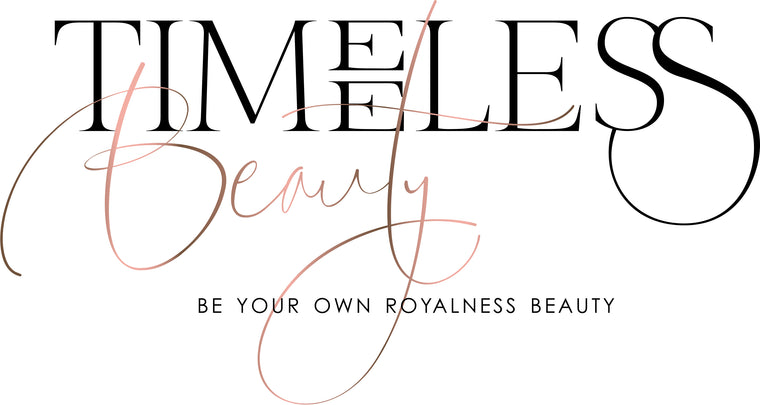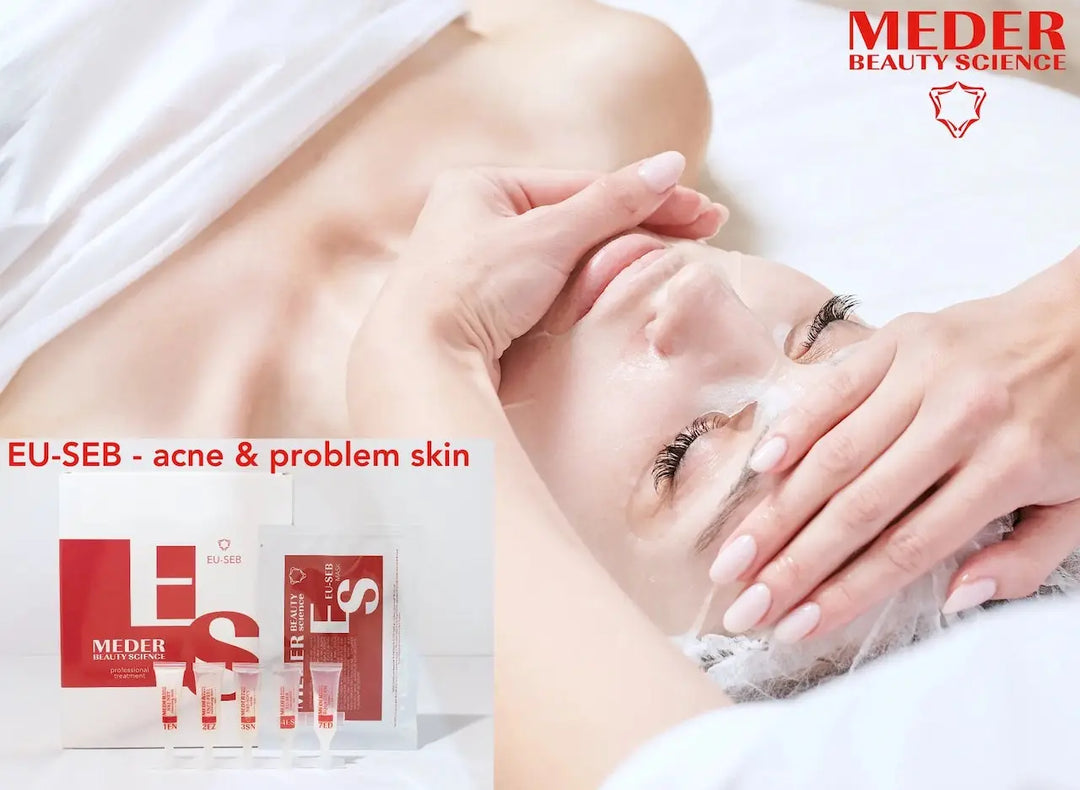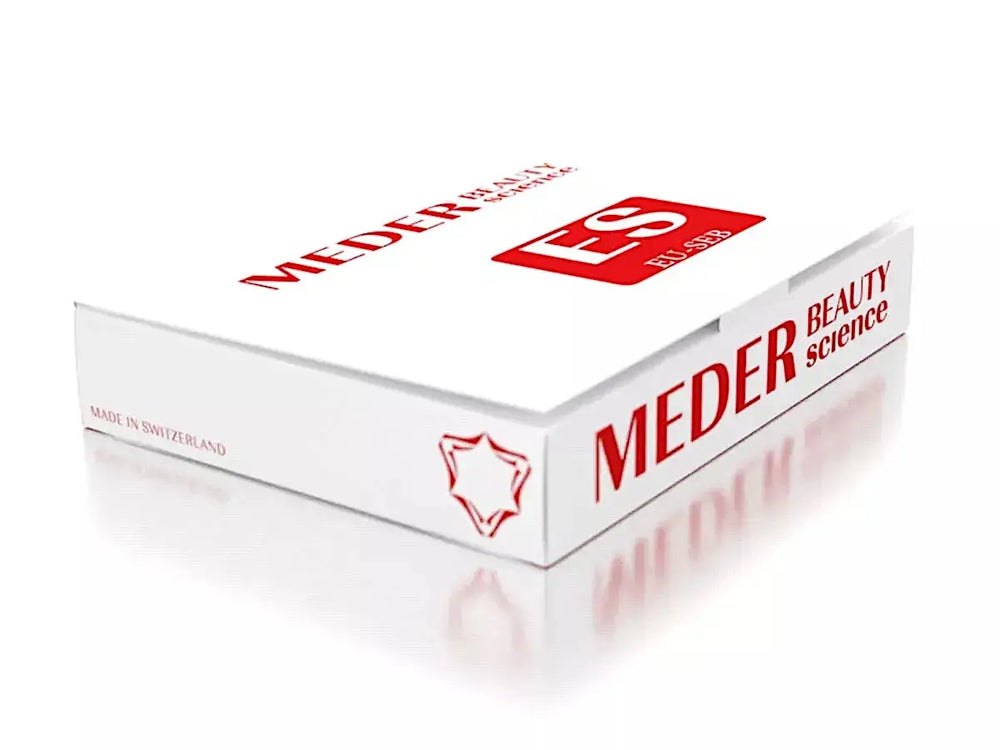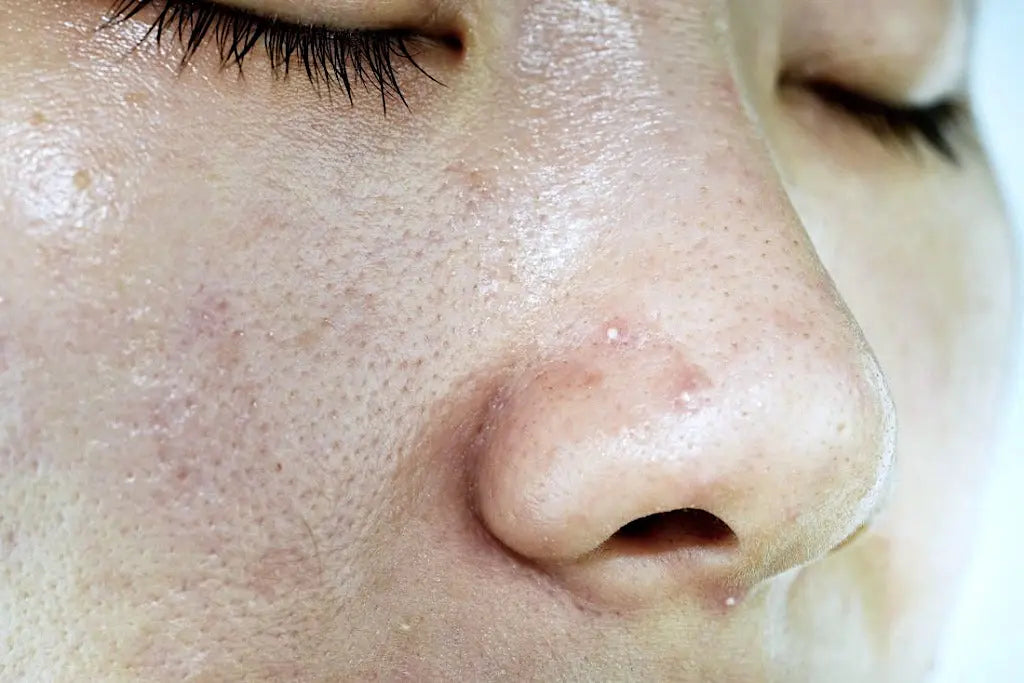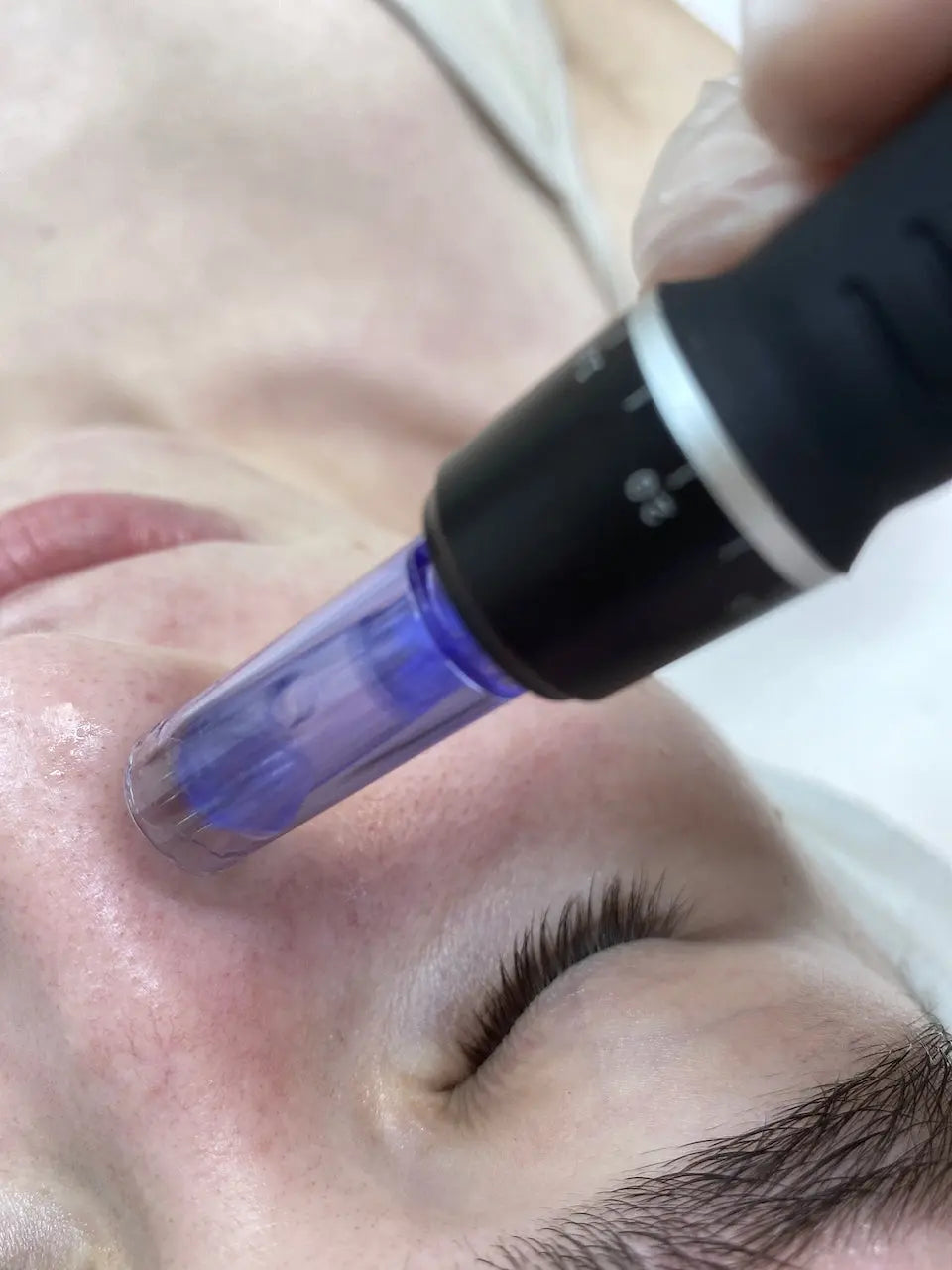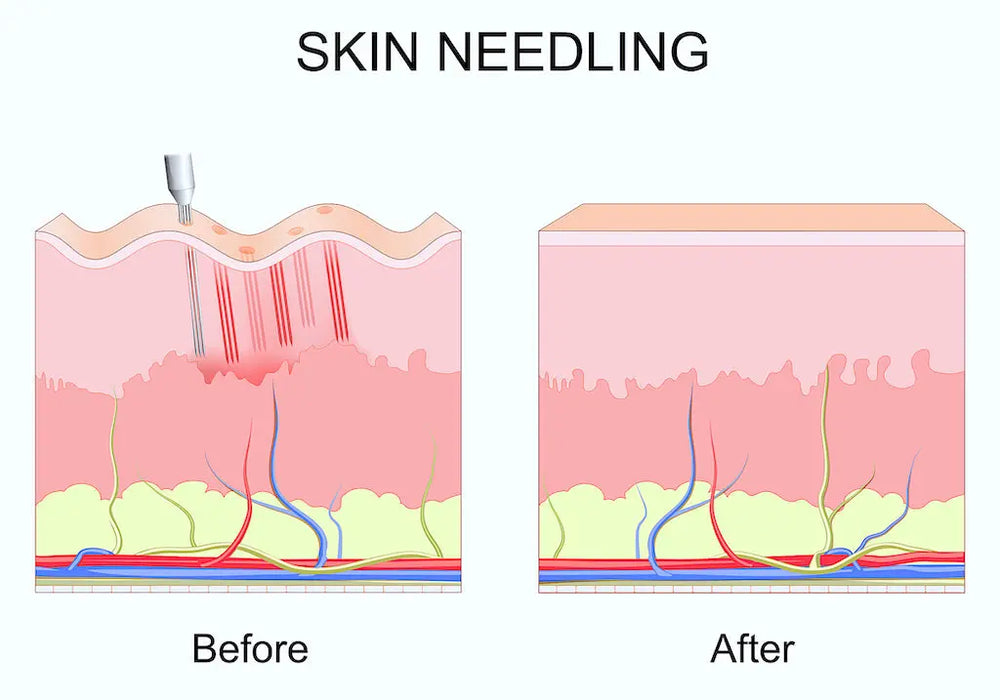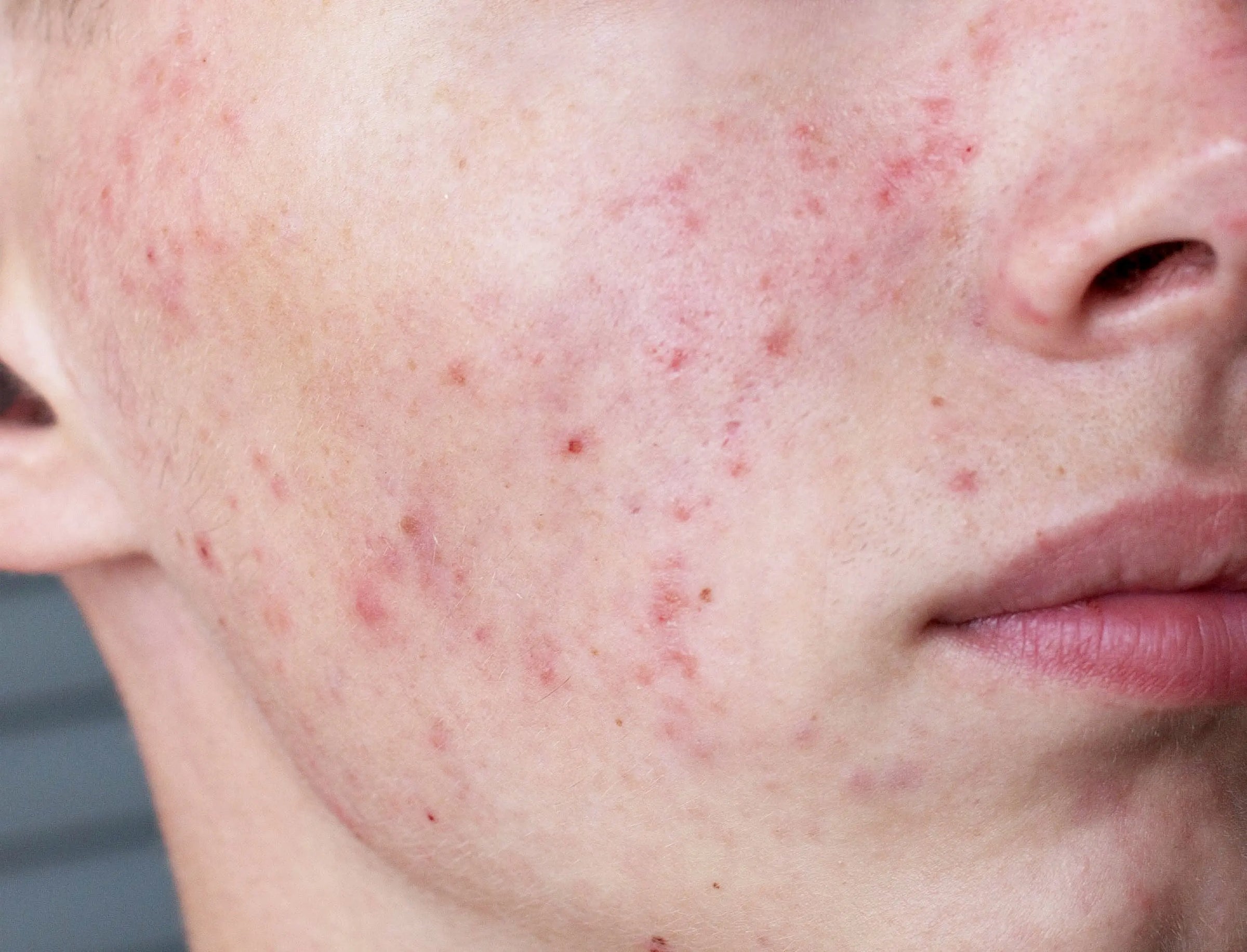
ACNE
Emotional well-being is just as important as your skincare routine.
Whiteheads / Blackheads
Papules / Pimples
Nodules / Cystic lesions
Sebum production
Bacteria Propionibacterium acnes
Inflammation
About Acne
Acne, scientifically termed acne vulgaris, is a multifactorial skin condition characterized by the development of comedones (blackheads and whiteheads), papules, pustules, nodules, and cysts. These lesions typically arise due to the blockage of hair follicles by a combination of sebum (oil) and keratinocytes (skin cells).
The pathogenesis of acne involves several interconnected factors. Firstly, increased sebum production, often triggered by hormonal fluctuations during puberty, leads to the accumulation of oil within hair follicles. Concurrently, abnormal shedding of keratinocytes can result in the formation of a plug, further obstructing the follicle.
This environment provides an ideal breeding ground for Propionibacterium acnes (P. acnes), a bacterium that naturally resides on the skin but proliferates in the presence of excess sebum. P. acnes triggers an inflammatory response, contributing to the redness, swelling, and discomfort associated with acne lesions.
Acne can arise from various factors, including:
Hormonal Changes: Hormonal fluctuations during puberty, menstruation, pregnancy, and menopause can stimulate the sebaceous glands to produce more oil, leading to acne.
Excess Sebum Production: Overproduction of sebum (skin oil) can clog hair follicles, promoting the growth of acne-causing bacteria and inflammation.
Bacterial Growth: Propionibacterium acnes (P. acnes), a bacterium that normally resides on the skin, can proliferate in clogged hair follicles, triggering an inflammatory response.
Dead Skin Cells: Buildup of dead skin cells can block hair follicles, contributing to the formation of acne lesions.
Genetics: Genetic predisposition plays a role in acne development, with certain individuals being more prone to the condition due to inherited factors influencing sebum production and follicular hyperkeratinization.
Dietary Factors: Some studies suggest that high glycemic index foods, dairy products, and certain dietary habits may exacerbate acne in susceptible individuals.
Stress: Stress can worsen acne by triggering hormonal changes and promoting inflammation.
Cosmetics and Skincare Products: Certain cosmetics and skincare products containing comedogenic ingredients can clog pores and exacerbate acne.
Medications: Some medications, including corticosteroids, hormonal therapies, and anticonvulsants, may contribute to acne development as a side effect.
Environmental Factors: Exposure to pollutants, humidity, and certain climates can influence acne severity in some individuals.
Acne typically appears on areas of the body with the most oil glands, such as the face, forehead, chest, upper back, and shoulders.
Acne can be triggered by :
• Hormonal Changes: Fluctuations in hormone levels, particularly during puberty, menstruation, pregnancy, and menopause, can stimulate the sebaceous glands to produce more oil, leading to acne flare-ups.
•Excess Sebum Production: Overproduction of sebum (skin oil) can clog pores and create an ideal environment for acne-causing bacteria to thrive.
• Bacterial Growth: Propionibacterium acnes (P. acnes) bacteria, which naturally reside on the skin, can multiply in clogged pores and trigger inflammation, leading to acne lesions.
• Dietary Factors: Certain foods with a high glycemic index, such as sugary snacks and processed carbohydrates, may worsen acne in some individuals. Dairy products and foods rich in saturated fats have also been linked to acne.
• Stress: Emotional stress can lead to hormonal changes that may exacerbate acne. Stress hormones like cortisol can stimulate the sebaceous glands to produce more oil, leading to breakouts.
• Cosmetic and Skincare Products: Some cosmetics and skincare products contain • comedogenic ingredients that can clog pores and aggravate acne. Heavy or occlusive makeup can also trap oil and bacteria on the skin.
• Medications: Certain medications, including corticosteroids, hormonal contraceptives, and anticonvulsants, can trigger or worsen acne as a side effect.
• Environmental Factors: Exposure to environmental pollutants, high humidity levels, and hot climates can increase oil production and contribute to acne formation.
• Friction and Pressure: Tight clothing, helmets, backpack straps, and other sources of friction or pressure on the skin can exacerbate acne, especially on areas prone to breakouts.
• Poor Skincare Habits: Using harsh or abrasive skincare products, overwashing the skin, and failing to remove makeup properly can irritate the skin and worsen acne.
For people with darker skin tones, acne can lead to specific complications like scars (including pitted and keloid types) and changes in skin color (hyperpigmentation or hypopigmentation) once the acne clears up.
Preventing acne involves adopting healthy skincare habits and lifestyle choices to minimize factors that contribute to its development:
• Cleanse Gently: Wash your face twice daily with a gentle cleanser to remove excess oil, dirt, and impurities without stripping the skin's natural moisture barrier. Avoid harsh scrubbing, as it can irritate the skin and exacerbate acne.
• Moisturize: Use a lightweight, non-comedogenic moisturizer to keep your skin hydrated without clogging pores. Even oily skin needs hydration to maintain a healthy balance.
• Avoid Touching Your Face: Refrain from touching your face with your hands, as it can transfer bacteria and oils from your fingers to your skin, leading to breakouts.
• Choose Non-Comedogenic Products: Select skincare, makeup, and haircare products labeled as "non-comedogenic" or "oil-free" to minimize the risk of pore clogging and acne formation.
• Limit Makeup Use: If you wear makeup, choose products that are non-comedogenic and remove makeup before bedtime to prevent clogged pores and breakouts.
• Protect Your Skin: Apply a broad-spectrum sunscreen with SPF 30 or higher daily to protect your skin from harmful UV rays, which can worsen acne and cause post-inflammatory hyperpigmentation.
• Healthy Diet: Eat a balanced diet rich in fruits, vegetables, whole grains, and lean proteins. Limit intake of sugary, high-glycemic foods and dairy products, which may exacerbate acne in some individuals.
• Stay Hydrated: Drink plenty of water throughout the day to keep your skin hydrated and promote overall skin health.
• Manage Stress: Practice stress-reducing techniques such as meditation, yoga, deep breathing exercises, or engaging in hobbies to help manage stress levels, which can contribute to acne flare-ups.
• Regular Exercise: Engage in regular physical activity to improve circulation and reduce stress, but be sure to shower and cleanse your skin afterward to remove sweat and bacteria.
• Avoid Smoking: Smoking can worsen acne and impair skin healing. Quitting smoking can improve overall skin health and reduce the risk of acne breakouts.
• Consult a Dermatologist: If over-the-counter treatments are not effective in managing your acne, or if you experience severe or persistent breakouts, consult a dermatologist for personalized treatment options and recommendations.
Modern Approaches to Acne Management: Balancing the Microbiome
Traditionally, acne management has revolved around two primary strategies:
1. For effective acne management, cleansing the skin and targeting Propionibacterium acnes, the bacteria linked to acne, are key. Common approaches involve using antiseptics like benzoyl peroxide and various acids, such as salicylic acid. However, these methods may inadvertently eliminate beneficial bacteria and offer only short-lived improvements.
2. Another approach focuses on sebum control, where retinol and its derivatives come into play. These substances help regulate the activity of 5-alpha-reductase, which in turn reduces sebum production. With less sebum, the conditions for Propionibacterium acnes become less favorable, slowing down acne-related processes and inflammation. Nonetheless, retinoids can sometimes irritate the skin and compromise its barrier function, and their anti-acne effects may not be permanent.
The Newest Frontier: Microbiome-Friendly Acne Treatment
We're revolutionizing acne treatment by focusing on restoring your skin's micro-environment, known scientifically as the microbiome or ecoflora. Within this ecosystem, beneficial bacteria play a crucial role in fighting acne bacteria, expelling harmful species, and producing anti-inflammatory agents. This holistic approach not only calms hyperactivity but also addresses inflammation effectively. Surprisingly, restoring your skin's microbiome involves methods similar to those used for balancing gut bacteria: prebiotics and probiotics.
It's important to note that our microbiome-friendly approach to acne treatment doesn't involve antibiotics, disinfectants, or antibacterial agents like alcohol, acids, or benzoyl peroxide. These substances can disrupt the growth and function of beneficial bacteria, inadvertently eliminating them along with harmful flora.
Acne isn't just a skin issue—it can deeply impact your mental health by affecting your appearance and self-esteem. Often, hormonal factors beyond your control contribute to acne, leading to stress that may trigger more breakouts. Whether you're a teenager or an adult, dealing with acne can be tough. If it's causing anxiety or affecting your social life, consider reaching out to a healthcare provider or mental health professional for support.
Remember, taking care of your emotional well-being is just as important as your skincare routine.




